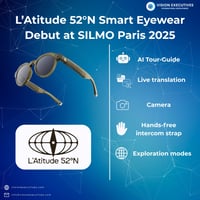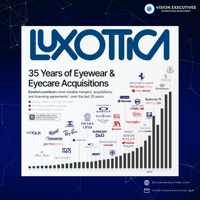Smart eyewear meets style. Berlin-based L’Atitude 52°N has launched its Departure Collection...
Dry age-related macular degeneration (AMD)—a progressive retinal disease—may soon be more treatable and accessible thanks to Alcon’s plans to acquire LumiThera, Inc.’s Valeda photobiomodulation (PBM) system.
Previously, treatment options for dry AMD were extremely limited. Now, the Valeda system offers real hope, providing a non-invasive therapy backed by strong clinical results.
How it works: The Valeda PBM device uses three distinct wavelengths of low-level light therapy to stimulate mitochondrial function and support retinal cell health. With Alcon’s global reach and the Valeda system’s proven efficacy and safety over two years of trials, this technology could soon be available to patients worldwide.


